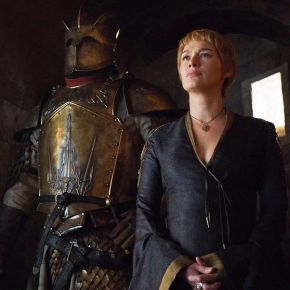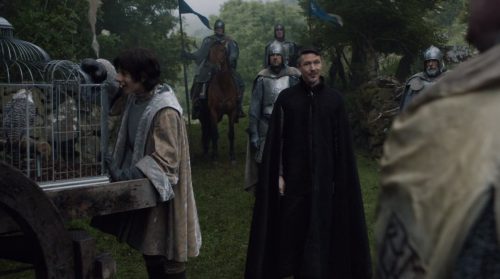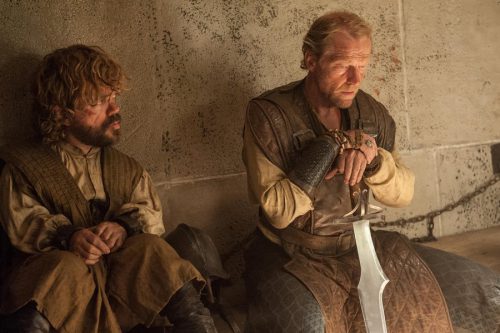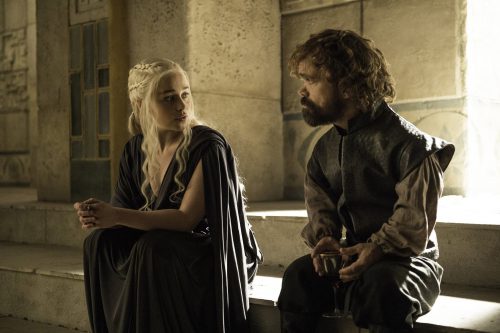
Into the interregnum – spoilers abound. (Click here to listen to a special GoT episode of The Mockingcast, in which a few of us try to make sense of the religious elements of the show/books.)
Cersei Lannister, first of her name: married to King Robert Baratheon in the wake of Robert’s Rebellion. Bereaved of Robert in a boar hunt gone awry, thwarted a power-grab traitor Eddard Stark in its wake, and consolidated the Kingdoms behind Joffrey I. Helped broker an alliance between Tyrell and Lannister, bedrock of security in the Seven Kingdoms during rebellions by the North, the Iron Islands, and Stannis Baratheon. In the wake of Joffrey’s poisoning by his enemies, exiled the traitors Sansa Stark and Tyrion Lannister, and strives still to bring them to justice. Forced into a public disgrace as a result of a coup by the Faith Militant, she destroyed the hypocrites, as well as the ambitious Tyrells. After losing a daughter to Dornish treachery and another son to mental illness, she was forced to accede to the Iron Throne in Season 6, Episode 10, and will continue to destroy those who threaten the royal family and stability of the realm.
So might read Cersei’s entry in the history books, were she to write one. The view from Maegor’s Holdfast is an appealing one: two pillars frame the city laid out below, with the smoldering ruins of her former enemies in the middle – bright and sunny. The camera pans out slowly, tranquil; Cersei takes another sip of wine, and heads downstairs to torture the septa. The view from Tommen’s window is less appealing: on either side of the two pillars framing his view of the city is a latticework screen; he can look at nothing else. The camera lies still; he is fixated. He cannot detach, cannot turn himself away from the destruction of his city, his wife, and his new-fledged faith. He sets aside the crown, and he jumps.
Elsewhere, Walder Frey tries to write Cersei’s twin brother’s story in the books, and Jaime’s having none of it. Two kingslayers, two men to whom even their critics grovel, while sniggering behind their backs. Who cares? They live, and their enemies don’t. But Jaime can’t quite take the smug circle of affirmation, and makes a point to tell Walder that he and his house are not good for very much. Look closely at Jaime’s own history, as he chooses to write it, in the White Book, the record of the Kingsguard, back in season 4:
Defeated in the Whispering Wood by the Young Wolf Robb Stark during the War of the Five Kings. Held captive at Riverrun and ransomed for a promise unfulfilled. Captured again by the Brave Companions, and maimed at the word of Vargo Hoat their captain, losing his sword hand to the blade of Zollo the Fat. Returned safely to King’s Landing by Brienne, the Maid of Tarth.
Here’s a man who’s played the classic Lannister game of brutal opportunism and failed. He was never quite as bad as they said (he may well have saved King’s Landing by killing Aerys, the Mad King), but has gotten a good bit better since meeting Brienne, who sticks in his thoughts as an unwelcome spectre of what true honor, and true strength, look like. Brienne, who is not wealthy, beautiful, cunning, or powerful like the Lannisters, but stronger all the same. Neither is she ambitious – devoting perhaps the best sword-arm in the Seven Kingdoms to a girl who, at the time, didn’t possess much in the way of life-prospects – yet doing more good than Jaime has. So he’s torn between two ideals, an old and a new, where doing the right thing might eventually result in a hasty sororicide.
In the meantime, it’s worth noting that every major house is Westeros is gutted: neither Lannister nor Baratheon nor Stark nor Martell nor Tyrell have living heirs.[1] Arryn’s led by sickly Sweetrobin, Greyjoy’s in a civil war (but there’s cause for hope there), and the last Tullys are sitting in a dungeon. The Faith Militant, at least their HQ in King’s Landing, is gone. Someone even arranges to have the Grand Maester stabbed for good measure. So there’s a vacuum of power and institutions, and no one’s left to challenge Cersei.
This means she can tell whatever story she chooses, and hers is an increasingly isolated one. While there may not be anyone left to defy her (although I’m guessing KL’s smallfolk don’t like it when you blow up the Great Sept), there’s no one left to really legitimate her, either.
Clearly, one lesson from this season is that war is terrible. When institutions are stripped of their power – when Reformation theologians call the law’s first use ceases to operate – it’s straight Lord of the Flies, a point that wasn’t exactly subtle with last night’s passel of knife-wielding kids.
It’s more than a bit anachronistic, but one could view medieval society as composed of groups of competing interests that would check each other: kings would check nobles, and nobles, if a king got out of hand, could come together to check the king. And so on, down the line. But sometimes when war breaks out, there’s too much chaos, and no one can check human nature anymore. George R.R. Martin hates war, and he hates righteousness because it can be used to justify war. In the real world, people are heroes and villains in shades of grey; it’s the heroes-and-villains way of thinking that gets people killed, since it’s only that kind of thinking which allows person A to justify killing person B.
So for all society’s flaws, which war can sometimes correct, often the status quo (read: insane Targaryen king) is better than the chaos which can follow a remaking. In the chaos that follows, the unchecked sin at the core of human nature gets the best of some people (Ramsay) while others are able to keep it in check and keep plodding along (Brienne).
Here’s where it gets interesting: the second sort of people are those who are in touch with their own weakness, who cannot see in black-and-white terms because such line-drawing has too often put them on the wrong side. Brienne has always been a misfit in (decreasingly) traditional-gender-roles Westeros; Jon Snow sat at the low table in the Great Hall; Davos was born poor and has since lost his finger, his children, and his king; Jaime didn’t have much good in him until he lost that hand (sidenote: someone should send Martin a copy of Flannery’s collected stories before he starts writing book seven).
King’s Landing has always been about shades of grey, and the finale didn’t disappoint. I suspect many of us rooted for Cersei as she blew up those fundamentalists – but then there’s that brilliant shot of the Sept’s bell flying toward the townsfolk. When she tells Unella to “confess”, if you’re a bad person like I, you probably got a shiver of righteous satisfaction. But then the Mountain comes in, and the sound team won’t let us stop listening to Unella’s screams, even after the door’s closed.
So we’re back to the problem of the impotence of right-handed power. Capon himself said,
You can snatch your baby boy away from the edge of a cliff and not have a broken relationship on your hands. But just try interfering with his plans for the season when he is twenty, and see what happens, especially if his chosen plans play havoc with your own.
The lesson was tragically borne out last night, over muffled screaming from somewhere in the otherwise-tranquil view from the Red Keep. Cersei’s lived her whole life to protect her children and ensure the continued reign of the Lannisters, and their last rightful (sort of?) king died as a direct result of her scheming. Violence begets violence, and we prefer scapegoating others to reckoning with the suffering in the universe or admitting our part in it.
Maybe Westeros is beyond repair, and maybe Daenerys needs to burn it all and start over: fire and blood. But as William Golding himself once admitted, the political parable of Flies was an “attempt to trace the defects of society back to the defects of human nature.” If Daenerys’s own misgivings and her worries that she’s becoming an emotional shell (save for the anger we’ve seen) weren’t worrying enough, the carnival of blood as the seven-year-olds close in around Pycelle should be worrying enough. I can’t help but quote Solzhenitsyn here:
The line separating good and evil passes not through states, nor between classes, nor between political parties either – but right through every human heart – and through all human hearts. This line shifts. Inside us it oscillates with the years. And even within the hearts overwhelmed with evil, one small bridgehead of good is retained. And even in the best of all hearts, there remains…an un-uprooted small corner of evil.
The final shot of the ships represents a truly exciting possibility for Westeros – a change that will come at brutal cost but may be necessary anyway. Yet it is misleading. The books, and to an extent the show, follow individual characters precisely because the real struggle lies there, and the real story is in the heart’s oscillations. Otherwise, to keep quoting things we like to quote, the tale becomes nothing more than a story of “defeats in which nobody loses anything of value, of victories without hope and, worst of all, without pity or compassion.” The fact that the writers have accomplished a lot this season while keeping some of the grey area, at least in last night’s episode, should be cause for encouragement. In the wars to come, hopefully that’s not lost.
Finally, Pycelle, RIP.
[1] In the shows, at least. And under Dornish law or a matrilineal marriage, Sansa can keep the Starks going. Bran’s MIA as far as the Westerosi are aware, and Jon’s (finally) a Targaryen.

COMMENTS
Leave a Reply
















